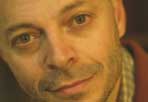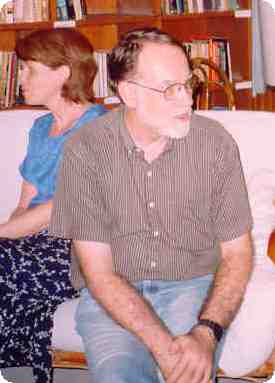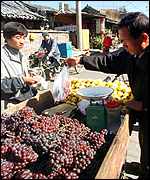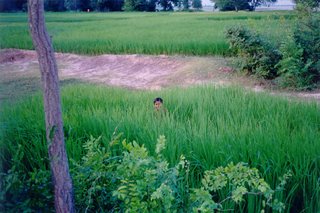Creation, Fall and New Creation
I found some pictures again and am missing my past once again!
The International Christian Fellowship was an integral part of my spiritual growth and support during my years in Phnom Penh. I stumbled upon their webpage (amazing - everyone has one nowadays!) and pictures of people made me homesick again. Paul Gioia, a songwriter/singer from Australia, is pictured there because he will be making another visit to Cambodia in September. I miss singing many of his songs in corporate worship.
and support during my years in Phnom Penh. I stumbled upon their webpage (amazing - everyone has one nowadays!) and pictures of people made me homesick again. Paul Gioia, a songwriter/singer from Australia, is pictured there because he will be making another visit to Cambodia in September. I miss singing many of his songs in corporate worship.
 I also can't adequately express how much I miss our former pastor, Graham Chipps, and his wife, pillars in the ICF community and a tremendous encouragment and example to me personally. I still laugh when I think of Graham's dry, dry Australian sense of humor and his amazing way of bringing unity in one of the most diverse settings I have ever worked and lived. I always appreciated his realistic approach to life that acknowledged the messiness of being human, our innate vulnerabilities and sin and our incredible need for God. He was not afraid to name difficulties for what they were and did not intimidate people with a super-spiritual attitude toward those difficulties or conflicts in life. I think we all need someone like that to help us stay afloat in the torrents of life and stay on course.
I also can't adequately express how much I miss our former pastor, Graham Chipps, and his wife, pillars in the ICF community and a tremendous encouragment and example to me personally. I still laugh when I think of Graham's dry, dry Australian sense of humor and his amazing way of bringing unity in one of the most diverse settings I have ever worked and lived. I always appreciated his realistic approach to life that acknowledged the messiness of being human, our innate vulnerabilities and sin and our incredible need for God. He was not afraid to name difficulties for what they were and did not intimidate people with a super-spiritual attitude toward those difficulties or conflicts in life. I think we all need someone like that to help us stay afloat in the torrents of life and stay on course.
Again, as I reflect on my life abroad, I realize how much of a challenge it is to keep from becoming lax and complacent in American culture. Life is too comfortable. I need to keep searching, keep learning, keep longing for something more, for what God's mission is here. Otherwise I feel like my vision becomes narrowed, like blinders control a horse. All I notice is what is right in front of me, my family, my friends, what is going on right here. That's what I need to worry about. It can become an excuse to not notice what is going on in the broader community and the world. And I know that the more comfortable I become and live, the less I can identify with those whose lives are not comfortable, who struggle with pain, and who also need peace.
Graham Chipps once wrote, "Everything human, even when at its best, is a disappointment . . . as we see both Creation and Fall present in everything everyday, we also find in Jesus new beginnings. We make sense of our lives as we hold these three together (even in the worst of hard times); as we see the realities of Creation, Fall and New Creation in the everyday experience of life. As [Paul] Minear ['Christians and the New Creation'] states, 'to let go of any one of these is defeat. To hold onto all is the hope of a new beginning that will not disappoint.'"
I also love the reassuring words to the chorus of a song I learned recently (Billy and Cindy Foote):
You are God alone
Through the good times and bad
You are on Your throne
You are God alone
You're unchangeable
You're unshakeable
You're unstoppable
That's what You are.
I guess I never want to become so comfortable that I lose my sense of Creation and Fall, for then the hope of the New Creation is no longer Good News; we can't experience the Peace in the storms of life if we are constantly working to protect ourselves from the storms. As I look at my life in America, a lot of the focus is on protection - personal protection, property protection, national protection, you name it. Such little trust. It can be depressing, especially when I see Christians adapting that focus too. Remembering my life overseas, especially living in a third-world country reminds me -- I can't give into that attitude . . . I just can't . . . it just seems to de-value the Hope I say I have.
The International Christian Fellowship was an integral part of my spiritual growth
 and support during my years in Phnom Penh. I stumbled upon their webpage (amazing - everyone has one nowadays!) and pictures of people made me homesick again. Paul Gioia, a songwriter/singer from Australia, is pictured there because he will be making another visit to Cambodia in September. I miss singing many of his songs in corporate worship.
and support during my years in Phnom Penh. I stumbled upon their webpage (amazing - everyone has one nowadays!) and pictures of people made me homesick again. Paul Gioia, a songwriter/singer from Australia, is pictured there because he will be making another visit to Cambodia in September. I miss singing many of his songs in corporate worship.  I also can't adequately express how much I miss our former pastor, Graham Chipps, and his wife, pillars in the ICF community and a tremendous encouragment and example to me personally. I still laugh when I think of Graham's dry, dry Australian sense of humor and his amazing way of bringing unity in one of the most diverse settings I have ever worked and lived. I always appreciated his realistic approach to life that acknowledged the messiness of being human, our innate vulnerabilities and sin and our incredible need for God. He was not afraid to name difficulties for what they were and did not intimidate people with a super-spiritual attitude toward those difficulties or conflicts in life. I think we all need someone like that to help us stay afloat in the torrents of life and stay on course.
I also can't adequately express how much I miss our former pastor, Graham Chipps, and his wife, pillars in the ICF community and a tremendous encouragment and example to me personally. I still laugh when I think of Graham's dry, dry Australian sense of humor and his amazing way of bringing unity in one of the most diverse settings I have ever worked and lived. I always appreciated his realistic approach to life that acknowledged the messiness of being human, our innate vulnerabilities and sin and our incredible need for God. He was not afraid to name difficulties for what they were and did not intimidate people with a super-spiritual attitude toward those difficulties or conflicts in life. I think we all need someone like that to help us stay afloat in the torrents of life and stay on course.Again, as I reflect on my life abroad, I realize how much of a challenge it is to keep from becoming lax and complacent in American culture. Life is too comfortable. I need to keep searching, keep learning, keep longing for something more, for what God's mission is here. Otherwise I feel like my vision becomes narrowed, like blinders control a horse. All I notice is what is right in front of me, my family, my friends, what is going on right here. That's what I need to worry about. It can become an excuse to not notice what is going on in the broader community and the world. And I know that the more comfortable I become and live, the less I can identify with those whose lives are not comfortable, who struggle with pain, and who also need peace.
Graham Chipps once wrote, "Everything human, even when at its best, is a disappointment . . . as we see both Creation and Fall present in everything everyday, we also find in Jesus new beginnings. We make sense of our lives as we hold these three together (even in the worst of hard times); as we see the realities of Creation, Fall and New Creation in the everyday experience of life. As [Paul] Minear ['Christians and the New Creation'] states, 'to let go of any one of these is defeat. To hold onto all is the hope of a new beginning that will not disappoint.'"
I also love the reassuring words to the chorus of a song I learned recently (Billy and Cindy Foote):
You are God alone
Through the good times and bad
You are on Your throne
You are God alone
You're unchangeable
You're unshakeable
You're unstoppable
That's what You are.
I guess I never want to become so comfortable that I lose my sense of Creation and Fall, for then the hope of the New Creation is no longer Good News; we can't experience the Peace in the storms of life if we are constantly working to protect ourselves from the storms. As I look at my life in America, a lot of the focus is on protection - personal protection, property protection, national protection, you name it. Such little trust. It can be depressing, especially when I see Christians adapting that focus too. Remembering my life overseas, especially living in a third-world country reminds me -- I can't give into that attitude . . . I just can't . . . it just seems to de-value the Hope I say I have.






